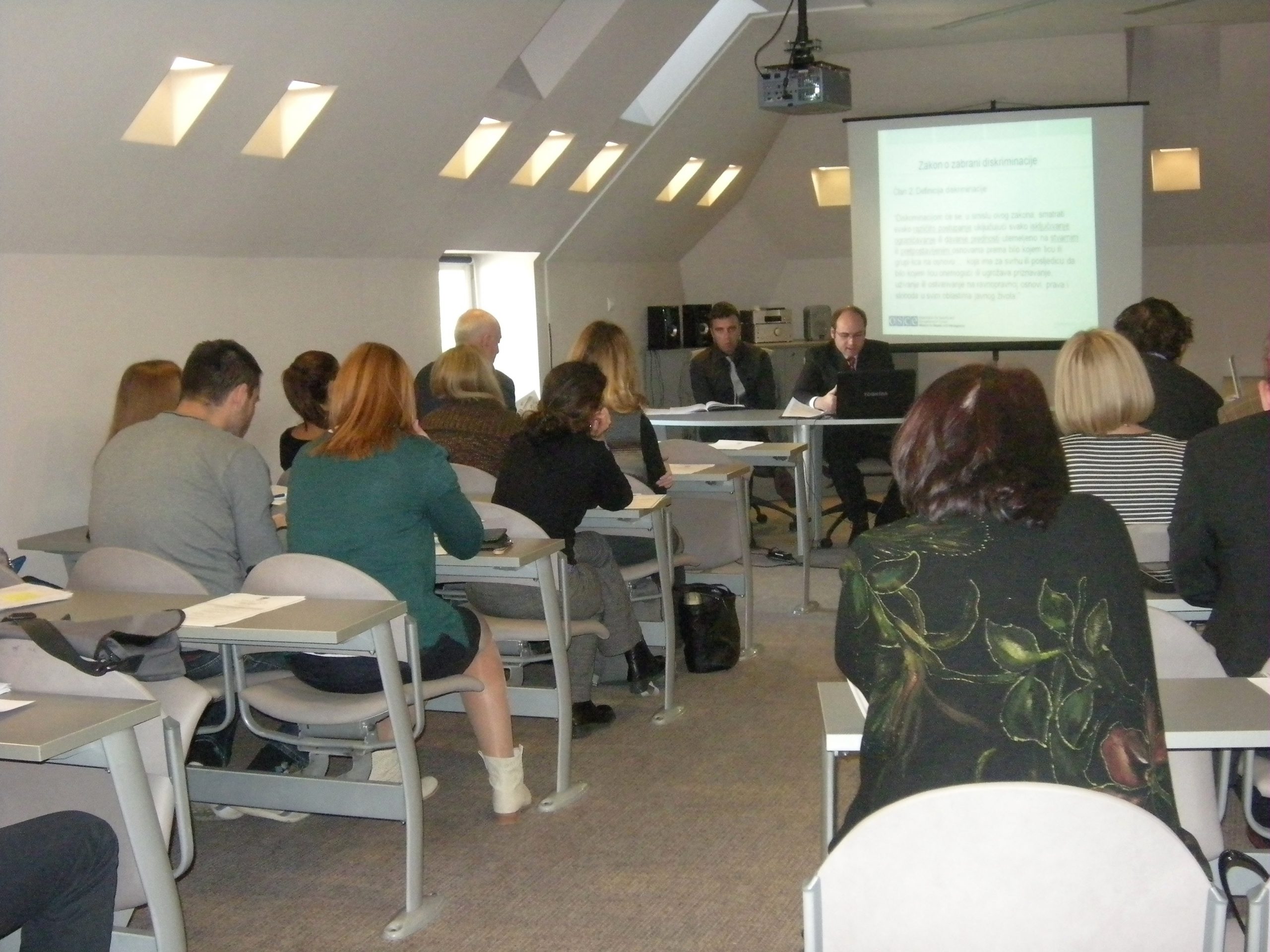On October 04, 2013, the roundtable “Law on Prohibition of Discrimination in BiH: Challenges in Implementation” was held in Banja Luka in the conference room of the Palas Hotel. The roundtable was organized by the Association for Democratic Initiatives (ADI) and the Human Rights Center in Sarajevo on behalf of the Justice Network – an informal network of 64 non-governmental organizations active in the justice sector – with technical support from the USAID Justice Sector Development Project II. The roundtable was attended by leading representatives from the legal field of action against discrimination, as well as experts in issues of research, advocacy and public action in human rights, as well as representatives of civil society, media and international organizations in BiH, with a total of 27 participants and lecturers.
The aim of the roundtable was to open communication between the non-governmental and governmental sectors on the situation and problems recorded in the implementation of the Law on Prohibition of Discrimination in BiH, and through the presentation of the analysis of the existing legal framework, to identify key shortcomings and problems and offer recommendations for more effective implementation of the Law and improvement of the human rights situation in BiH.
During the roundtable, the lecturers presented to the participants 5 topics related to the implementation of the Law on Prohibition of Discrimination in BiH.
– Mr. Čorni, representative of the OSCE Mission to BiH, briefed the participants on the introductory notions of discrimination and the procedural provisions of the Law and mechanisms of protection.
– Representative of the Human Rights Ombudsman Institution BiH, Mr. Raosavljevic presented the “Annual Report on Occurrences of Discrimination in BiH for 2012” prepared by the Ombudsman Institution in BiH.
– Mrs. Taraba, representative of the Ministry of Human Rights and Refugees of BiH, presented the Rulebook on the Method of Collecting Data on Discrimination Cases in BiH, as well as the Questionnaire on Data Collection, which contains data on discrimination cases sorted by form of discrimination, area in which discrimination is recorded, grounds of discrimination, institution relevant to the procedure and the type and outcome of the procedure conducted.
– Mr. Hogić presented the topic “Application of the Law on Prohibition of Discrimination through Legal Mechanisms for the Protection of Human Rights”.
– Mr. Dragišić, representative of the association “Vaša prava BiH”, presented the observations of the non-governmental sector on the shortcomings and obstacles that arise through the implementation of the Law on Prohibition of Discrimination in BiH.
Based on the presentations, a discussion was opened between participants and presenters, and conclusions and recommendations were drawn up in order to make the implementation of the Law on Prohibition of Discrimination in BiH as effective as possible in practice.
Conclusions:
Despite the fact that the Law on Prohibition of Discrimination in Bosnia and Herzegovina stipulates that every citizen has the right to enjoy constitutionally and legally guaranteed rights without discrimination on any grounds, in practice, this is not the case. The established mechanisms of protection, unfortunately, did not ensure that every victim of discrimination was treated with full respect for the victim’s dignity and that victim’s complaint was treated in a serious and confidential manner.
Although the Anti-Discrimination Law entered into force in 2009, an action plan for its implementation has not yet been adopted. The deadline for the adoption of this action plan was one year from the date of the adoption of the Anti-Discrimination Law. In 2013, the Ministry of Human Rights and Refugees of BiH adopted the Rulebook on the manner of collecting information on cases of discrimination in BiH, as well as a Questionnaire on information collection containing data on cases of discrimination. A positive development has been made by defining the relevant institutions for the submission and processing of data, and by planning the establishment of a single central database for recording discrimination cases. The questionnaire on the collection of data on discrimination cases, which the institutions will use, will greatly facilitate the way data are collected and processed. However, the questionnaire itself needs to be refined especially in terms of defining the form and basis of discrimination in the area in which discrimination is committed.
Although the law came into force in 2009, the jurisprudence records a very small number of cases in which this law was properly implemented.
On the other hand, citizens are not aware of their rights to the extent necessary to adequately protect their rights. Most persons who experience discrimination and violence do not file complaints against the perpetrator of discrimination for fear of revealing their identity.
The role of non-governmental organizations in helping victims of discrimination remains very large, ranging from care for victims, counseling and free legal assistance, to monitoring court proceedings and advocating for changes to existing legislation. Under the existing law, the chapter regulating “Procedures for Protection against Discrimination”, the problem is evident that the courts have different interpretations of Article 20, which relates to the initiation of a collective action. In the three cases where an NGO brought a collective action, the three cantonal courts interpreted the jurisdiction of the NGOs differently.
Recommendations:
- Analyze legislation and by-laws, and assist legislatures at all levels of government in BiH to achieve equality of persons with disabilities, national minorities and returnees, and to enjoy rights including human, civil and political rights on an equal basis with other citizens of BiH, which is also the obligation of BiH under international conventions and standards.
- With regard to amendments to the Questionnaire on Collection and Records of Discrimination, incorporate the category of persons with disabilities into forms of discrimination, and incorporate sexual orientation as a form of discrimination in the grounds of discrimination.
- Insist on adherence to the deadlines provided for in the Regulations concerning the establishment of a central database for the record of discrimination cases,
- Insist that the relevant institutions harmonize their records with the Regulations, until December 31, 2013,
- Improve cooperation between the non-governmental sector, the Ministry of Human Rights and the Ministries of Justice at all levels, free legal aid centers, in order to make the above amendments in accordance with the needs of citizens in BiH,
- With regard to the care of victims of discrimination, taking into account the discriminatory provisions of the existing free legal aid laws relating to the conditions for acquiring the right to free legal aid and the territorial jurisdiction of victim advocacy centers/institutes, work to improve the existing free legal aid systems,
- Advocate for the harmonization of case law relating to the right to bring a collective action by non-governmental organizations,
- Advocate for the Judicial and Prosecutorial Training Centers in both Entities to reintroduce into their educational program topics related to the Anti-Discrimination Law,
- Continue advocacy efforts to adopt an action plan for the Anti-Discrimination Law,
- Work to inform citizens about existing anti-discrimination mechanisms.
At the end of the discussion, Ms. Ivandić thanked all participants for their time and active participation during the roundtable, and informed all those present that the minutes from the roundtable will be sent to everyone for comments.
The agenda of the roundtable can be downloaded here: Okrugli-stol-Agenda-4102013




